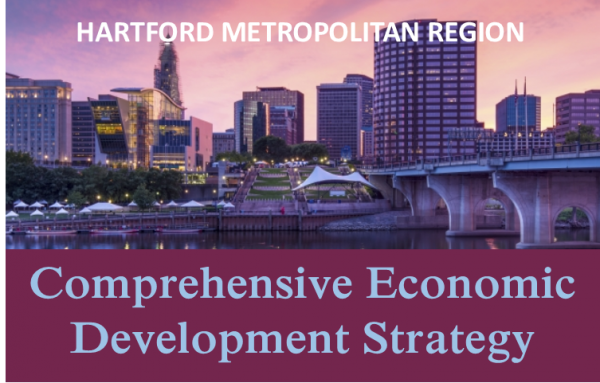Hartford Region Coalition Embarks on Development of Economic Strategy
/A coalition of prominent business, transportation and community development organizations in the Hartford Metropolitan Region has begun the process of taking a fresh look at its position in the global economy, with an eye toward taking advantage of economic opportunity.
In announcing the initiative, the organizations noted that the region and the state have struggled to recover from the 2008 recession and that global, national, and local trends are reshaping the region’s economy. The state and many of the region’s 38 municipalities face increasingly difficult fiscal situations that hamper their ability to pursue projects that will lead to growth, officials said.
Recognizing that these trends, if left unaddressed, can dramatically impact the region, the organizations – the Capitol Region Council of Governments (CRCOG), Hartford Foundation for Public Giving (HFPG) and MetroHartford Alliance - will be working as an advisory committee to develop a new Comprehensive Economic Development Strategy (CEDS) for the Hartford Metropolitan Region. The most recent strategy was developed in 2012, and a previous effort took place in 2006.
“This strategy will take a hard look at the region and identify and prioritize the most promising opportunities for creating lasting economic growth. This region is a leader in insurance, finance, and advanced manufacturing; we need to build on these strengths to encourage the kind of growth that will lead to lasting fiscal stability,” said Jim Scannell, Senior Vice President, Administrative Services, at Travelers and co-chair of the CEDS Advisory Committee.
The effort gets underway with new leadership at the helm at a number of the organizations, which may impact the perspective along the way, if not the final results. Led by the CRCOG, and longtime Executive Director Lyle Wray, the initiative is in partnership with the Hartford Foundation, where President Jay Williams, a former Assistant Secretary of Commerce for Economic Development and mayor of Youngstown, OH relocated to the region last year, and the MetroHartford Alliance, which hired David Griggs, mostly recently leading economic development efforts in Minneapolis-St.Paul as its new President and CEO. Williams joins Scannell as co-chair of the CEDS Advisory Committee.
The consulting firm of Fourth Economy Consulting has been hired to help the region complete a situational assessment and develop “game changer” initiatives to serve as the core of a new economic development strategy. Fourth Economy, based in Pittsburgh, recently worked with the 100 Resilient Cities initiative to help cities around the world become more resilient to economic changes.
The process will be led by an advisory committee comprised of representatives of businesses, governments, educational institutions and non-profits throughout the region. A smaller working group, comprised of partner organizations like the New Britain Chamber of Commerce, will work closely with the consulting team and the advisory committee to develop a regional vision and turn it into an actionable plan.
Four primary tasks have been identified for the initiative:
- Goal-Setting: Build consensus around the need for accelerating inclusive/equitable economic growth; that is raising incomes across the income distribution with particular attention to opportunities for engaging those who have often been left behind.
- Situational Analysis: Do a clear-eyed assessment of our situation: who, what, where to identify opportunities that we should be pursuing as a metropolitan region (i.e., SWOT with an emphasis on context and opportunities).
- Strategic Planning: Formulate a limited number of “game changer” strategies that will move the trajectory of inclusive economic growth in the right direction.
- Capacity-Building: Identify organizational forms and collaborations that we will need to implement and sustain the strategies over time.
During this process the Advisory Committee will also identify potential partner organizations and set up an organizational structure to implement the initiatives. A final strategy report is due next winter. CRCOG has set up a website that already includes key resources, and will be updated as the work proceeds during the year.
 “There is only one way our region will achieve equitable and sustainable economic growth. We must eschew the past squabbles and divisions that have kept us mired in anemic progress,” said Jay Williams, president of the Hartford Foundation and co-chair of the CEDS Advisory Committee. “If we commit to a bold, collaborative, and pragmatic approach, we can develop a roadmap to capitalize on the enormous talent and multiple assets our region possesses. I’ve seen the success of this approach in other parts of the country and there is absolutely no reason it can’t occur here, unless we lack the collective will to make it happen.”
“There is only one way our region will achieve equitable and sustainable economic growth. We must eschew the past squabbles and divisions that have kept us mired in anemic progress,” said Jay Williams, president of the Hartford Foundation and co-chair of the CEDS Advisory Committee. “If we commit to a bold, collaborative, and pragmatic approach, we can develop a roadmap to capitalize on the enormous talent and multiple assets our region possesses. I’ve seen the success of this approach in other parts of the country and there is absolutely no reason it can’t occur here, unless we lack the collective will to make it happen.”
Similar efforts occur throughout the state led by various economic development regions. The WestCOG Region’s first Comprehensive Economic Development Strategy (CEDS) was developed throughout 2017. WestCOG includes 18 towns in the Stamford - Norwalk - Danbury region of the state. Public comment on the draft plan was solicited last fall.
The state’s South Central Connecticut region, centered around New Haven, undertook a similar effort in 2013, which has been updated annually. The Strategic Planning Committee and sector subcommittees have been established for 2018, and are currently gathering data and input from community stakeholders, according to the website for that region’s economic strategy planning initiative. It is led by Economic Development Corporation of New Haven, a private, non-profit organization, dedicated to business and economic development within the city of New Haven and REX Development, which was formed as the economic development entity for the fifteen towns served by the South Central Regional Council of Governments (SCRCOG).
Of the Hartford region’s CEDS initiative, East Hartford Mayor Marcia Leclerc, the Chair of the CRCOG Policy Board said “Our metropolitan region needs to competitively position itself for the future in relation to other regions in the country, as well as globally. To do that we need to take a hard look at our current situation and our opportunities.”
































